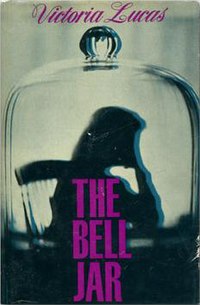But we'll follow up with that when the time comes.
Because my progressio
 n with House is so slow, I decided to simultaneously start a smaller book to keep the ball rolling. With that I came upon #433. The Bell Jar, which I found online. I'd been familiar with this book as one that was always on the bookstores' bookshelves as popular reads for young women, which is really one of the reasons why I was always so adverse to liking (or even trying) it.
n with House is so slow, I decided to simultaneously start a smaller book to keep the ball rolling. With that I came upon #433. The Bell Jar, which I found online. I'd been familiar with this book as one that was always on the bookstores' bookshelves as popular reads for young women, which is really one of the reasons why I was always so adverse to liking (or even trying) it.I'm familiar with Plath through her poetry. I knew she had a very strong, feminine voice that I didn't mind (I'm not very keen on feminist propaganda, but I liked her sing-songy voice and mix of young but heavy-handed imagery...except for some of her daddy attachments - despite the fact that I know she lost her father at a young age), and The Bell Jar was in the same way. Robert Taubman's review describing the novel as "the first feminine novel in a Salinger mood" is right. There is that exact youthful something- what's the word...not naivety, but something like that mixed with rebellion. Stubbornness? Over-emphasized self-awareness? - that Salinger has, but Plath's use of it is so much more fluid and unfocused on a specific topic. I guess what I mean is, more true-to-life in the stream of conscious way that one thing just leads to another and we all just float along.
Esther's situations and state of mind move so rigidly and boldly, it's surprising to think back on. Her posh and rewarded life in the beginning is so dramatically different from the other two "habitats" she lives in, that it's jarring to think that all of this is happening in the same story, to the same girl. I don't exactly think that Esther the character changes much from the beginning to end. Perhaps it's more that she becomes less cautious as time goes on, and lets the blankness replace her youthful curiosity. Curiosity does still remain until the end, but less so than before (as her interests become fewer, or maybe more honed in on, as time goes on).
I feel like I don't even know what I'm saying right now.
I guess I appreciate this narrative less as a story about Esther, than as Plath talking about her own mental goings-on. I'm more interested in what was happening inside Plath's head than I am of what will happen to Esther after her interview, and as I read I imagine her writing this - as I have written stories based on my own self - than anything else. I guess I saw a part of me in Plath (not Esther, though she is a reflection of her, but Plath as she wrote this) as a writer, which to me was a little bit disconcerting as I know that many girls must feel a connection to this story, based on its popularity. Maybe I'm more of a generic American female reader than I'd like to admit.
In the meantime, back to reading the novel I keep terrifying myself over.
No comments:
Post a Comment